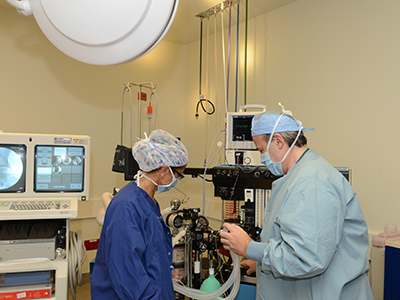
The Anesthesia Care Team (Click to Expand)
Going into surgery, patients often don’t realize the essential role the anesthesiologist and the Anesthesia Care Team plays in making sure that operations go smoothly and safely.
Our Anesthesia Care Team is made up of physician anesthesiologists and nurse anesthetists. Each team member has an important role. They work together to provide the optimal care for patients.
The physician anesthesiologist leads the team and has 12 years to 14 years of education and 12,000 hours to 16,000 hours of clinical training, which is needed to effectively evaluate a patient’s medical condition, recommend an appropriate anesthesia plan, diagnose and treat problems that might surface during a procedure and follow through with the patient post-procedure. The physician anesthesiologist may delegate patient monitoring and appropriate tasks to the nurse anesthetists but retains overall responsibility for the patient
The Physician Anesthesiologist (Click to Expand)
Physician anesthesiologists are highly trained medical experts who evaluate, monitor and supervise patient care before, during and after surgery.
They have the specific medical education to make critical decisions should an emergency arise or if a routine procedure becomes complicated, making every second count.
The training physician anesthesiologists receive makes them uniquely qualified pain medicine experts who work outside of the operating room to diagnose, evaluate and treat patients who suffer from pain. Physician anesthesiologists use a comprehensive approach that can include medication and pain control procedures, whether the pain is a result of an accident or incident, ongoing pain caused by a medical condition or pain experienced by some cancer patients.
Role of the Physician Anesthesiologist (Click to Expand)
When preparing for surgery, many patients think of the physician anesthesiologist as just the person behind the mask who puts them to sleep and wakes them when it’s over. They may not realize the comprehensive medical care the physician anesthesiologist provides between those two points and beyond.
Physician anesthesiologists play a vital role in a patient’s medical care, making decisions to protect and regulate critical life functions. They serve as the patient’s advocate and typically are the first to diagnose and treat medical problems or complications that may arise before, during and after surgery. They have a wide range of knowledge about medications and how the human body works and responds to the stress of surgery at all stages of a procedure. Think of physician anesthesiologists as your seat belt during surgery: When there is an emergency or complication, they can save your life.
- Before surgery: Physician anesthesiologists evaluate the patient to develop an anesthesia plan, taking into consideration the patient’s medical history and physical condition.
- During surgery: Physician anesthesiologists use advanced technology to monitor the body’s functions and determine how best to regulate and treat the body’s vital organ systems while administering a personalized, delicate balance of anesthetic medications. In some hospitals, nurse anesthetists may assist the physician anesthesiologists with the monitoring. However, physician anesthesiologists are responsible for interpreting the monitoring and making medical judgments about the patient’s responses and necessary treatment.
- After surgery: Physician anesthesiologists reverse the effects of the anesthetic medications and return the patient to consciousness. They keep the patient in a comfortable state during recovery and are involved in providing critical care medicine in the intensive care unit.
The Certified Registered Nurse Anesthetist (CRNA) (Click to Expand)
In addition to our team of highly skilled, experienced physicians, RAA's Certified Registered Nurse Anesthetists (CRNAs) are licensed professional nurses (RNs). Nurses begin their extensive two to three year CRNA education with a minimum of a BSN or another appropriate Bachelor’s degree. Nurses must complete a Master’s degree thereby becoming Advanced Practice Nurses who specialize in anesthesia care. CRNAs are also highly skilled in critical care nursing and become nationally certified by exam after graduation. CRNAs work with anesthesiologists to provide excellence in patient care and in the administering of anesthesia.
Information Adapted from the American Society of Anesthesiologists